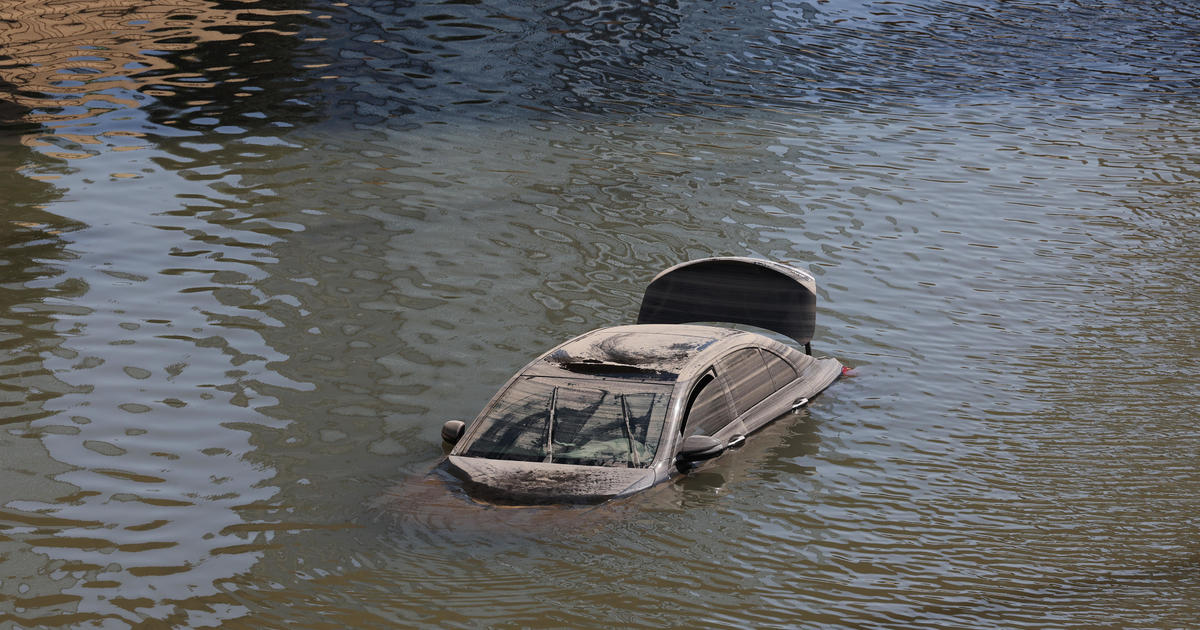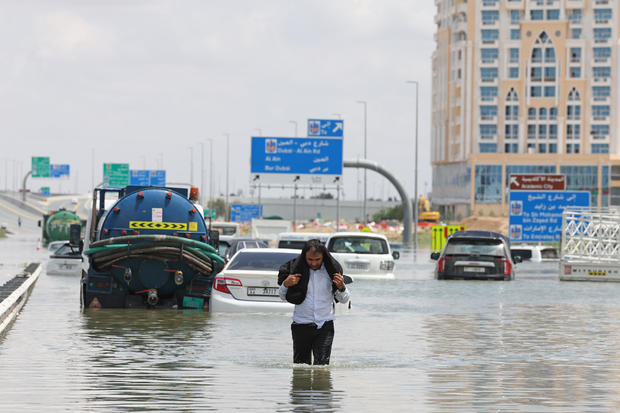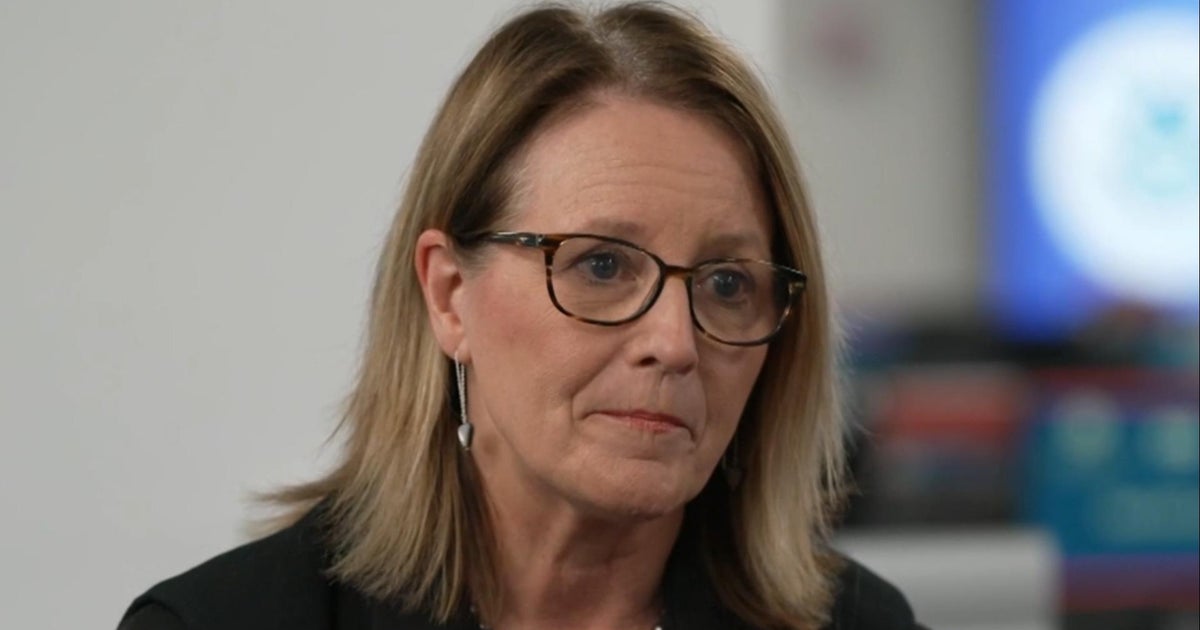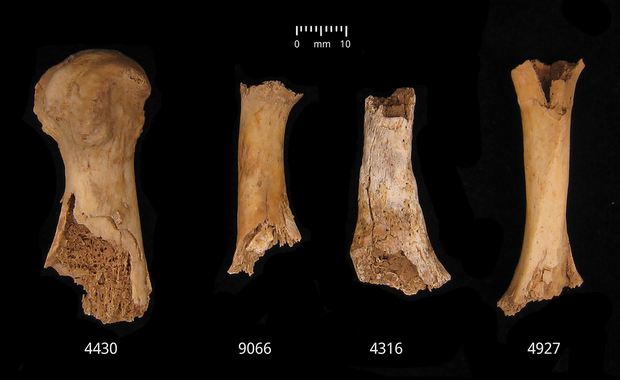CBS News
What is cloud seeding and did it play any role in the Dubai floods?

Stranded airline passengers and a cat submerged in floodwaters clinging to a car door handle became notable moments this week in Dubai as the normally arid city was inundated with historic levels of rain. Claims have gone viral that the deluge was brought on by cloud seeding, a technique that aims to increase precipitation, that is heavily utilized in the United Arab Emirates.
But is it really to blame?
Daniel Swain, a climate scientist at the University of California, Los Angeles, said that getting to the bottom of the “record-shattering extreme rainfall” requires breaking down the science behind the event and the technique.
“There’s currently a disconnect in the online discourse between the kind of human activities that likely did affect it (greenhouse warming) versus those which have actually been the focus of the online conversation thus far (cloud seeding), and what this means for how we collectively understand our ability to actively affect the weather on different spatial and temporal scales,” he said in an emailed statement.
What is cloud seeding?
Many have questioned since the downpour in Dubai whether cloud seeding was to blame. But what is cloud seeding and how does it work exactly?
Cloud seeding is a technique used to improve precipitation. According to the Desert Research Institute, scientists do this by putting tiny particles called nuclei into the atmosphere that attach to clouds.
“These nuclei provide a base for snowflakes to form. After cloud seeding takes place, the newly formed snowflakes quickly grow and fall from the clouds back to the surface of the Earth, increasing snowpack and streamflow,” the institute says.
In the Middle East, instead of precipitation in the form of snow, its cloud seeding program generates increased rain.
Scientists typically go about cloud seeding in two ways – using either generators on the ground or distributing the nuclei via aircraft.
Christopher Pike/Bloomberg via Getty Images
What caused the rain in Dubai?
But was the rain in Dubai from cloud seeding?
“Did cloud seeding play a role? Likely no,” Swain said. “But how about climate change? Likely yes!”
The world is continuing to see month after month of record-breaking heat and 2023 was the hottest year globally ever recorded. Scientists have found that warmer temperatures increase evaporation, resulting in more frequent and intense storms, such as the one that occurred in Dubai. Those conditions also fuel other extreme weather events, including droughts, putting opposing forces at intense odds that will likely strain communities without adequate adaptation.
Andrew Kruczkiewicz, senior researcher at Columbia Climate School, told CBS News he doesn’t believe there’s any current evidence at this time that cloud seeding pushed the downpour over the edge.
“This event was forecast fairly well days in advance and I think it’s unlikely that a cloud seeding operation would move forward given the well-forecast intense rainfall,” he said.
The nation’s National Emergency Crisis and Management Authority issued weather warnings on Monday before the storm’s arrival, urging people to comply with local instructions from authorities and asking them to stay at home and only leave in the case of an emergency.
Meteorologist Ryan Maue, former chief scientist at the U.S. National Oceanic and Atmospheric Administration, gave the Associated Press a more definitive answer: “It’s most certainly not cloud seeding.”
“If that occurred with cloud seeding, they’d have water all the time,” he said. “…when it comes to controlling individual rain storms, we are not anywhere close to that. And if we were capable of doing that, I think we would be capable of solving many more difficult problems than creating a rain shower over Dubai.”
The deluge, he said, “speaks more to questions around what are the resilience measures that are integrated into the urban planning standard operating procedures.”
“Almost everywhere on Earth there is a risk of flash flooding,” he said. “Yet, since it’s not the most frequent type of extreme event, sometimes it’s lower on the priority list when decisions need to be made around infrastructure or resilience, or just urban development more broadly.”
How significant was the flooding in Dubai?
More than 5.59 inches of rain fell over Dubai within 24 hours. While a half-foot of rain may not seem like much numerically, that’s more than what the city sees in an average year, and other parts of the UAE saw even higher levels.
It was a “historic weather event,” the state-run WAM news agency said, adding that it was beyond “anything documented since the start of data collection in 1949.”
Dubai is normally dry and with a downpour like this being so unprecedented, the city’s infrastructure was not prepared. The drainage systems were overwhelmed and Dubai International Airport, one of the busiest in the world, had to temporarily halt operations. One plane passenger told Reuters many people were waiting more than 12 hours to be able to resume travel. Footage from the airport shows planes taxiing in eerie floodwaters.
“Over a year’s worth of rainfall was experienced in just a few hours,” Kruczkiewicz told CBS News. “And why that’s important to to understand is that when you see this amount of rainfall in semi-arid arid area, the soil isn’t designed to filter the water as fast as in other areas. … You don’t need that much water falling or rainfall falling in a short period of time to cause major issues.”
Is cloud seeding effective?
According to the Desert Research Institute, how effective cloud seeding is depends on the specific project in which it’s being used. Citing several studies, the institute said it’s helped increase overall snowpack in some areas by at least 10% per year. Another study found that a five-year project in New South Wales, Australia resulted in a 14% snowfall increase.
The UAE’s National Center of Meteorology launched the Research Program for Rain Enhancement Science to advance the technology, saying that for dryer regions across the world, cloud seeding “could offer a viable, cost-effective supplement to existing water supplies.” Many regions even beyond the Middle East have been suffering from water scarcity issues, including Colombia, Mexico and Hawaii.
CBS News
Trump could target Affordable Care Act and Medicaid to help pay for lower taxes, experts say

The Affordable Care Act, also known as Obamacare, remains popular with the public, garnering the approval of 54% of U.S. adults, according to a recently released Gallup poll. But experts say that may not insulate the federal health insurance program from change as President-elect Donald Trump and his fellow Republicans look to renew $4 trillion in expiring tax cuts.
Many provisions of the 2017 Tax Cuts and Jobs Act (TCJA), a signature law passed during Trump’s first term, are due to sunset at the end of 2025. Republican leaders are now strategizing on how to extend the cuts, while the president-elect has also pledged to slash corporate taxes and eliminate taxes on workers’ tips and overtime pay.
But renewing the TCJA tax breaks alone without reducing federal spending would add nearly $4 trillion to the nation’s deficit through 2035, according to the Committee for a Responsible Federal Budget, an advocacy group focused on reducing the nation’s debt.
Trump has already taken two of the biggest government programs — Social Security and Medicare — off the table for potential cuts. Reduced defense spending is also viewed as unlikely, meaning nearly half of federal spending would be protected, Larry Levitt, executive vice president for health policy at KFF (formerly Kaiser Family Foundation,) said in a recent JAMA article.
That leaves “Medicaid, which is the next largest source of federal spending, and the ACA as prime targets for spending cuts. The math is inescapable,” Levitt stated.
Will Trump repeal the ACA?
By contrast, an outright repeal of the ACA is unlikely. While Trump has continued to criticize the health care expansion measure, he has retreated from his previous vows to axe the ACA entirely.
“President Trump will deliver on his pledge to make his highly successful tax cuts permanent and ease the financial burden on families across the country. He will also end the drain on our health care system so that our country can continue to care for Americans who rely on Medicaid, Medicare and Social Security,” Trump-Vance Transition Spokesperson Anna Kelly told CBS News.
Support for the ACA hit a record 55% in 2017, the first time a majority of Americans approved of the health care law since Gallup started asking about it in 2012. That high watermark came a month after failed efforts by then-President Trump and the GOP to repeal and replace the law.
“The Affordable Care Act is still politically divisive, but overall more popular with the public than ever,” Levitt told CBS MoneyWatch. “It’s unlikely Republicans will try to repeal the ACA again, but cuts to the ACA and Medicaid are quite possible if Republicans are looking to pay for tax cuts.”
Brad Ellis, senior director at Fitch Ratings, noted that Trump and Republican lawmakers have expressed interest in changing how the ACA operates, including introducing high-risk participant pools and possibly reducing subsidies for public exchange business. Such changes could hurt enrollment, he said in a recent report.
During the presidential campaign, Trump said he had “concepts of a plan” to replace the ACA.
“Obamacare stinks,” Trump recently told NBC News’ “Meet the Press. “If we come up with a better answer, I would present that answer to Democrats and to everybody else and I’d do something about it.”
Big cuts without lifting a finger
Republicans can make big cuts to the ACA simply by standing pat. That’s because enhanced ACA premium subsidies, which were enacted after President Biden was elected and the Democrats took control of Congress, are scheduled to lapse along with the 2017 tax cuts at the end of 2025. The drop in financial aid ACA enrollees would increase out-of-pocket premiums by an average of $705 a year, or 79%, according to a KFF analysis.
The Congressional Budget Office projects that letting the additional ACA subsidies expire would reduce the federal deficit by $335 billion over a decade, relative to extending them permanently.
Enrollment in the ACA nearly doubled to a record 21 million after the enhanced subsidies went into effect. The CBO estimates that 6.9 million fewer people would be enrolled in ACA Marketplace plans without the subsidies, and 3.4 million more would be uninsured.
The impact would be felt nationwide, but particularly in Southern states that have not expanded Medicaid eligibility under the ACA, according to Levitt, who noted that the five states with the fastest growth in ACA enrollment since 2020 are Georgia, Mississippi, South Carolina, Tennessee and Texas.
“Health care was not a big topic during the campaign, so I can imagine that voters could be surprised to see cuts to Medicaid and the ACA that they didn’t hear about during the campaign,” Levitt said. “As frustrated as people are with the current state of health insurance, disrupting the status quo makes them nervous.”
Medicaid a target for cuts?
Medicaid accounts for more than $600 billion a year in federal spending and covers 81 million people, according to KFF.
“There are indications that support for Medicaid will decrease under the new administration, suggesting lower enrollment and revenue headwinds for this program,” stated Fitch’s Ellis.
Trump was silent on Medicaid during the 2024 campaign, but his budget proposals during his first administration included a plan to cap federal spending on Medicaid. The Project 2025 plan prepared by the Heritage Foundation and a coalition of conservative groups, is recommending changes to Medicaid including a limit on federal spending.
“The centerpiece of several prominent plans — Project 2025, the Republican Study Committee fiscal year 2025 (RSC) budget and the fiscal year 2025 House GOP budget resolution — is to cap and deeply cut federal Medicaid funding,” Edwin Park, a research professor at the Georgetown University McCourt School of Public Policy’s Center for Children and Families, noted in September.
Trump sought distance himself from Project 2025 in the months leading up to the election, criticizing some of its policy proposal as “abysmal.”
But Levitt said the ACA and Medicaid could still end up facing cuts as the Republicans, who will control the White House and both houses of Congress, hash out their fiscal plans after President-elect Trump assumes office.
“So much depends on whether there is pressure to pay for tax cuts with spending reductions. If Republicans are willing to cut taxes and increase the deficit, we may not see big cuts to the ACA and Medicaid,” said Levitt. “There are Republicans who may insist on spending cuts to offset tax cuts. If that’s the case, the ACA and Medicaid are very likely to be on the chopping block.”
CBS News
Dozens of Britons were “killed and butchered” and then cannibalized after Bronze Age massacre, research shows

New research suggests that dozens of Bronze-Age era Britons were killed in an attack unlike any previous known to archaelogists studying that time period and location.
The research on human remains from Charterhouse Warren in southwest England, conducted by a team of researchers from multiple institutions including Oxford University, was published in Antiquity, a journal of world archaeology. It found that at least 37 Bronze Age-era men, women and children were “killed and butchered” and then cannibalized, with their bodies then thrown down a nearly 50-foot deep natural shaft. While archaeologists have found the remains of Bronze Age and later Britons who died violently, those incidents were largely isolated. Mass graves from this era have also been found, but the remains were laid to rest respectfully, unlike those studied.
Researchers first became aware of the shaft in the 1970s. Two excavations were conducted in the 1970s and 1980s. The human remains, as well as some artifacts including a flint dagger, were found at multiple spots in the shaft during these digs. More than 3,000 individual human bones and bone fragments have been recovered overall. Those bones were used to estimate that at least 37 individual sets of remains were in the shaft. Different bone lengths show that the people killed were both male and female, and ranged in age from infants to grown adults. Ongoing research is working to determine how the people were related to each other.
The way the remains were disposed of made the detailed examination possible, the researchers said. The shaft helped preserve the bones and keep them grouped together.
Cambridge University Press on behalf of Antiquity Publications Ltd
The bones “display clear evidence of blunt force trauma,” according to researchers, suggesting that many of the people in the shaft “suffered a violent death.” Other injuries, including removal of the scalp and severed muscles in the jaw suggesting removal of the tongue or lower jaw, also likely occurred, evidenced by marks on the bones, the researchers said. Some of the victims may have been beheaded or dismembered.
It’s possible that the victims were held captive or ambushed, because of the severity of the injuries, the researchers said. It’s not clear who could have carried out the attacks.
There is also evidence that the bodies were cannibalized, the researchers said, including human teethmarks on the bones and indicators that marrow, the soft tissue inside bones, was removed. The researchers said the cannibalism was likely conducted “within a context of a violent conflict, in which individuals are dehumanized and treated as animals.”
“Some 37 men, women and children—and possibly many more—were killed at close quarters with blunt instruments and then systematically dismembered and defleshed, their long bones fractured in a way that can only be described as butchery,” the researchers said.
Later in the publication, the researchers referred to the scene as a “massacre,” and suggested it may have even been a “political statement” of violence so brazen it would have “resonated across the wider region and over time.” However, it’s not clear what could have led to the violence: “Neither climate change, ethnic conflict nor competition over material resources seem to offer convincing explanations,” according to the researchers, leaving the only likely option that the violence broke out as part of a pattern of revenge or violence between communities.
“At this stage, our investigation has raised as many questions as it has answered,” the researchers said. “Work is ongoing to shed more light on this decidedly dark episode in British prehistory.”
CBS News
Trump team working out immigration plans, pushing for large-scale deportations

Watch CBS News
Be the first to know
Get browser notifications for breaking news, live events, and exclusive reporting.











